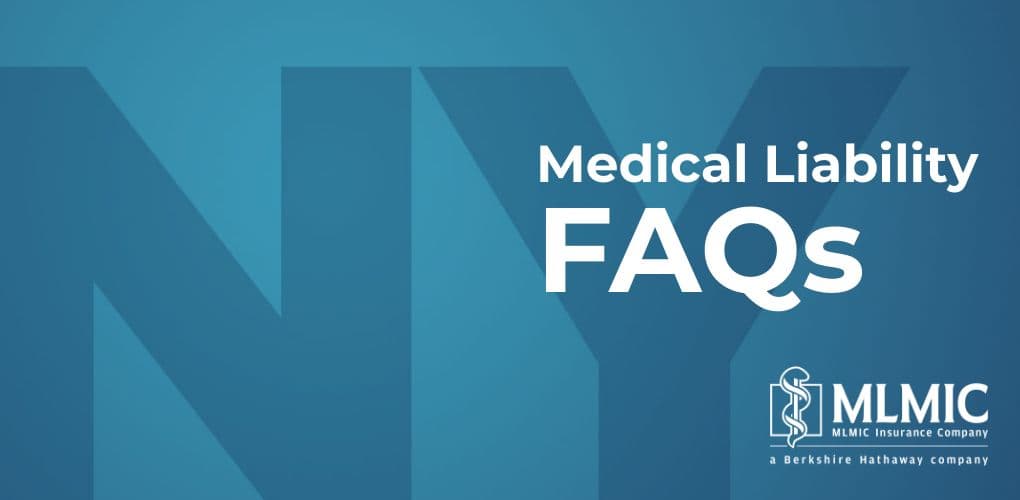< Back to Publications & Resources
Attorneys Respond to Medical Professional Liability FAQs on the Doctor-Patient Relationship

During the course of a year, the attorneys at Fager Amsler Keller & Schoppmann, LLP, counsel to MLMIC Insurance Company, handle approximately 5,000 questions from policyholders on professional liability, risk management and healthcare law. Frequently, the questions asked by healthcare professionals involve requests for legal guidance on the doctor-patient relationship.
Here, we’ve paired the FAQs on medical professional liability related to informed consent with the attorneys’ responses.
When does the doctor/patient relationship officially begin?
Today, it is often unclear when the doctor/patient relationship begins, and with the advent of managed care, this issue has become even more complex. Managed Care Organizations (MCOs) may deem the doctor/patient relationship to begin when the physician receives a list of patients who have chosen the physician as their primary attending. Thus, physicians must carefully review the lists received and protest to the MCO those patients the physician does not wish to accept. The relationship may otherwise be determined to begin when an appointment has been made, or when some other mechanism occurs by which an expectation of care arises (for example when an on-call physician treats a patient in the Emergency Department and advises the patient to be seen for a follow-up visit in his/her office at a defined time). If a doctor on-call has neither been called in for a consultation by the Emergency Department physician, nor treated the patient in the Emergency Department, the receipt of a courtesy copy of the Emergency Room record does not create a doctor/patient relationship. However, hospital bylaws may require such a follow-up appointment.
How do I discharge a patient from care?
To discharge a patient from care, you must notify the patient in writing. You have the option of giving the patient a defined reason. If the patient has been non-compliant with treatment or appointments, or if the doctor-patient relationship has been disturbed by litigation, non-payment or threats and abusive behavior by the patient or a family member, you may state a reason for discharge, i.e. there has been a disruption in the doctor/patient relationship. You should document if the patient is being discharged for non-compliance, i.e. “you have been non-compliant with my recommendations for care and treatment.” If you have received a request for records from an attorney, have been sued by the patient,or are merely uncomfortable in continuing to treat the patient, a reason does not have to be stated or you may use the relationship disruption as the reason. Do give the patient a reasonable amount of time to seek a new physician, e.g. 30 days from the date of the letter, during which time you will be available for emergencies only. The letter should provide resources which will assist the patient in obtaining a new physician, such as the names and phone numbers of the county medical society. We do not recommend that you list the names of specific physicians. If the patient belongs to an HMO, review their rules regarding initiation and discontinuance of the doctor/patient relationship. Fager Amsler Keller & Schoppmann, LLP, has sample form letters which can be modified for your use for discharging patients from your care. Remember, patients with urgent or serious conditions should not be discharged without immediate access to alternative care.
Must I continue to see a patient whose insurance I do not accept merely because I have seen the patient once in the Emergency Department as the on-call physician?
The answer to this depends both on the patient’s condition and the hospital by-law requirements. If the patient’s immediate problem has been resolved, unless the by-laws require you to provide a follow-up visit, you are not obligated to see that patient in your office. However, if the patient is in need of further care and the problem can be resolved in one or two office visits, you should probably see the patient and then discharge him/her from care by letter. If the patient continues to have an urgent or serious medical problem which requires continued care, you must be sure he/she has alternative and uninterrupted treatment prior to discharging him/her. If you are unable to do so, then you must complete the course of treatment for that medical problem, before discharging the patient from care.
The attorneys of Fager Amsler Keller & Schoppmann, LLP (FAKS) perform thousands of hours of professional liability services per year. They are uniquely qualified to assess medical-legal issues and provide counsel to minimize liability exposure. MLMIC policyholders can reach 24/7 legal support services by calling (855) FAKS-LAW or emailing hotline@FAKSLAW.com. For more information about these services, offered exclusively to MLMIC policyholders, visit our web page on Legal 24/7.



